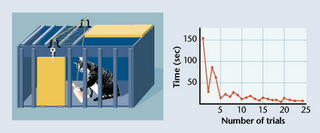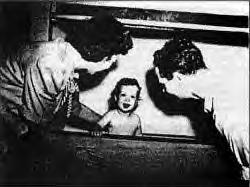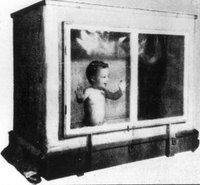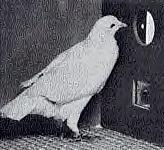 Following up with E. L. Thorndike's "puzzle boxes" (shown above) that showed cats could fairly quickly learn how to operate a tricky lever to release themselves from a box, Skinner put together a similar device that's now known as the Skinner box. Inside is a lever for mice to press or a backlit button for pigeons to peck in order to get chow from a food hopper. To properly motivate them, they are usually starved to 80% of their pre-training weight. The task I had in "Rat Lab" during college was to get the pigeon to peck the button - something that is actually pretty tricky to do. You've got to trip the hopper at just the right moment so you reinforce just the right behavior, otherwise you'll end up with a dancing, spinning, or head bobbing bird instead of one who diligently does the task at hand.
Following up with E. L. Thorndike's "puzzle boxes" (shown above) that showed cats could fairly quickly learn how to operate a tricky lever to release themselves from a box, Skinner put together a similar device that's now known as the Skinner box. Inside is a lever for mice to press or a backlit button for pigeons to peck in order to get chow from a food hopper. To properly motivate them, they are usually starved to 80% of their pre-training weight. The task I had in "Rat Lab" during college was to get the pigeon to peck the button - something that is actually pretty tricky to do. You've got to trip the hopper at just the right moment so you reinforce just the right behavior, otherwise you'll end up with a dancing, spinning, or head bobbing bird instead of one who diligently does the task at hand.Many times while training Katy (and while providing therapy to a young boy with autism during college) I have been glad to have had the training in operant conditioning that my college professor "Skinner" provided. The paradigm makes a lot of sense and is intuitive to apply. It's also easy to screw
 up if not done carefully. Think of all those parents who wind up rewarding their kids for exactly the behavior they're trying to extinguish. Whining at the grocery store is a classic example. My sister and I worked it on my mom all the time while growing up. We'd be up late talking and carrying on and she'd yell from the next room something about being quiet and going to sleep. We'd keep it up until she told us she'd take us to get DQ Blizzards the next day. What's crazy is that she actually followed through just often enough to make it rewarding for us to deliberately stay up making noise.
up if not done carefully. Think of all those parents who wind up rewarding their kids for exactly the behavior they're trying to extinguish. Whining at the grocery store is a classic example. My sister and I worked it on my mom all the time while growing up. We'd be up late talking and carrying on and she'd yell from the next room something about being quiet and going to sleep. We'd keep it up until she told us she'd take us to get DQ Blizzards the next day. What's crazy is that she actually followed through just often enough to make it rewarding for us to deliberately stay up making noise. Skinner believed in his theory so much that he applied it to his infant daughter Deborah. He constructed a box for her to live in complete with climate control (temperature and humidity), air filtration, and a bottom linen feed so that if she soiled her space it could be easily changed with a turn of a crank. The Air Crib, as he called it, was nothing more than a giant Skinner box. Time magazine wrote about it in 1971; you can read the full story here. This story has since become part of intro psych classroom legend with variations saying alternately that his daughter grew up to be severely depressed or a psychologist like her dad.
Skinner believed in his theory so much that he applied it to his infant daughter Deborah. He constructed a box for her to live in complete with climate control (temperature and humidity), air filtration, and a bottom linen feed so that if she soiled her space it could be easily changed with a turn of a crank. The Air Crib, as he called it, was nothing more than a giant Skinner box. Time magazine wrote about it in 1971; you can read the full story here. This story has since become part of intro psych classroom legend with variations saying alternately that his daughter grew up to be severely depressed or a psychologist like her dad. Skinner also worked for a while for the government - he drew up plans for a pigeon guided missile. Imagine that. Skinner's plan scored mention in a Richard Dawkins commentary on Sept 11 in the Guardian, "Religion's Misguided Missiles." It's a good, short read. His plan never got realized but the techniques he devised now get put to use training rats to sniff out land mines. It's a much cheaper and efficient solution than employing dogs or humans to do it. The BBC has a story on this cool rat lab research.
Skinner also worked for a while for the government - he drew up plans for a pigeon guided missile. Imagine that. Skinner's plan scored mention in a Richard Dawkins commentary on Sept 11 in the Guardian, "Religion's Misguided Missiles." It's a good, short read. His plan never got realized but the techniques he devised now get put to use training rats to sniff out land mines. It's a much cheaper and efficient solution than employing dogs or humans to do it. The BBC has a story on this cool rat lab research.


2 comments:
If you're going to mention the outrageous rumors of how Skinner raised his daughter, Deborah, you should also tell people that the lurid details are all completely fabricated. Skinner and his wife did use the Aircrib for Deborah, but there were no experiments, no rewards and punishments and no tracking of progress on a matrix, as some have suggested.
More importantly, Deborah Skinner did not develop a psychotic disorder, did not sue her father and certainly did not shoot herself (in a bowling ally in Billings, Montana, or anywhere else, for that matter) as the stories suggest.
Deborah Skinner, now Deborah Skinner Buzan, grew up happy and healthy, remained close to her famous father and is an artist in the UK.
Dude, that's why I called it a legend!
And, for what it's worth, it is totally impossible that Skinner used no rewards and no punishment with her. Everyone rewards and punishes everyone - it is part of human nature - indeed animal behavior - whether conscious or not. The simple fact of the matter is that when behavior is responded to, it will be received positively or negatively. The only way to escape reinforcement contingencies is to not respond at all to behavior. To imply that he ignored his daughter is, frankly, absurd. Clearly he did not.
Post a Comment